
English | 中文

Promoting Responsible Business Together丨 OECD Seminar on Responsible Business Conduct Successfully C
source:goldencsr date:2018-12-29 15:26:35
Responsible business conduct of enterprises is the crucial factor to creating a healthy business environment and the guarantee for promoting global trade and investment sustainability. For enterprises, responsible business conduct is conductive to attracting high quality investment, reducing corporate risks, securing stakeholders’ rights and creating more values.
To better drive enterprises’ responsible business conduct, OECD Seminar on Responsible Business Conduct was held by the Organisation for Economic Co-operation and Development (OECD) and China Federation of Industrial Economics (CFIE) in Guangzhou on December 13, 2018. The seminar attracted nearly one hundred representatives from institutions, governments and enterprises at home and abroad. As the supporting organization, GoldenBee participated in the preparation and media promotion of the seminar.
Mr. Tamas HAJBA, OECD Representative to China & Senior Advisor on China, Mr. Yaohua LU, Executive Vice Chairman of CFIE, and Mr. Bin FAN, Deputy Director General, Department of Law and Regulation, Ministry of Industry and Information Technology (MIIT) delivered opening and welcome remarks at the seminar.
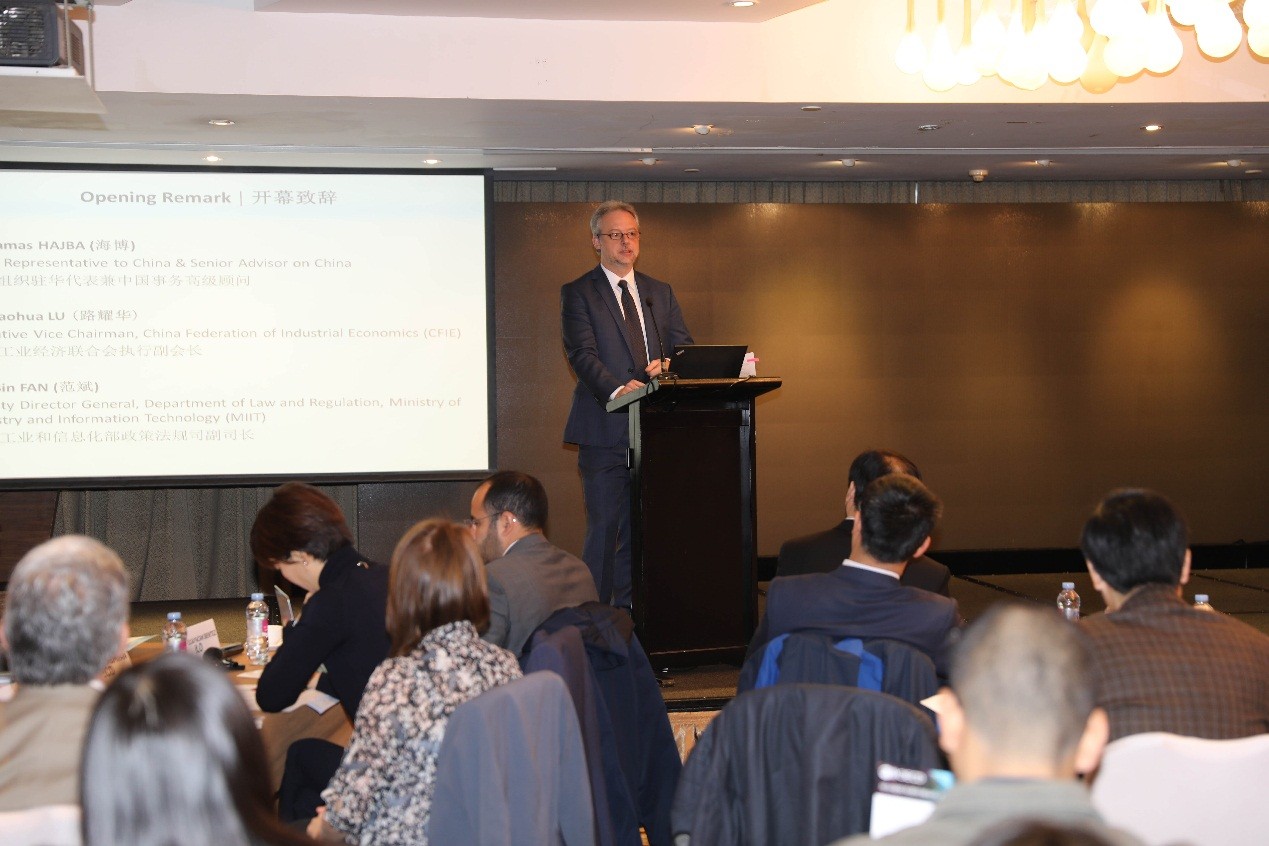
In his opening remarks, Mr. Tamas HAJBA underlined the importance of cooperation in tackling global business challenges, and introduced the universal principles, guidelines and instruments released by OECD. Meanwhile, he pointed out that responsible business conduct cannot be realised without support from governments. He expressed that through sharing and communication, enterprises could be hopefully motivated to better implement responsible business conduct.
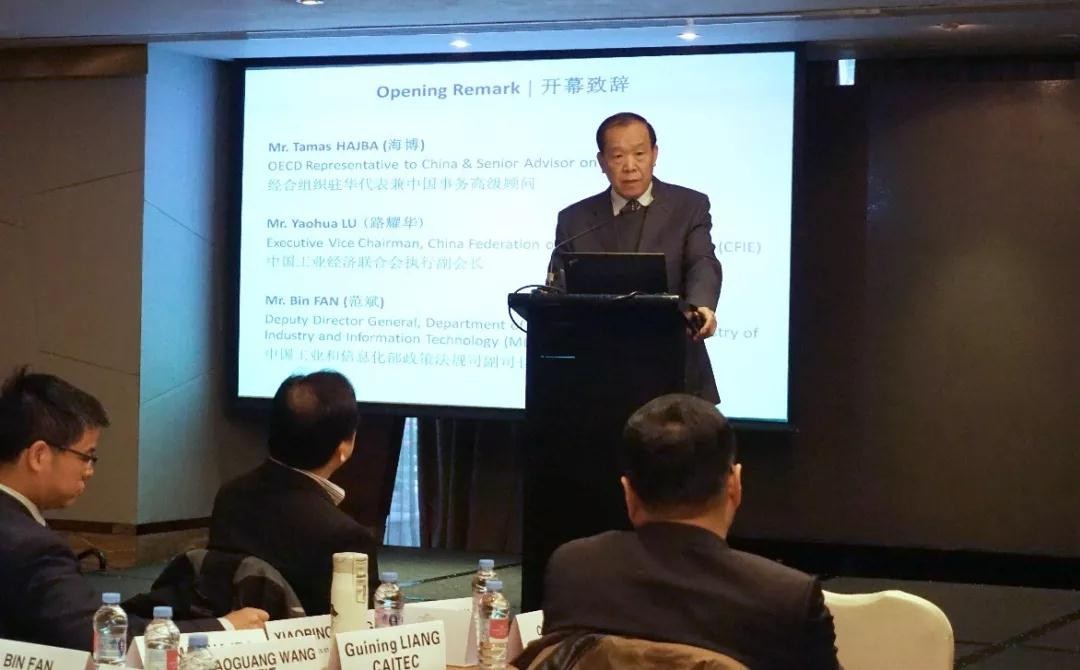
Mr. Yaohua LU acknowledged the significance of responsible business conduct to enterprises and economic and social sustainability. He expounded the guidance and provisions of the Chinese government and laws and regulations on responsible business conduct. Moreover, he shared recent work and achievements of CFIE and expressed anticipations of realizing more communication and cooperation with OECD and other international organizations to join hands with Chinese enterprises with a view to driving sustainable development of global economy.
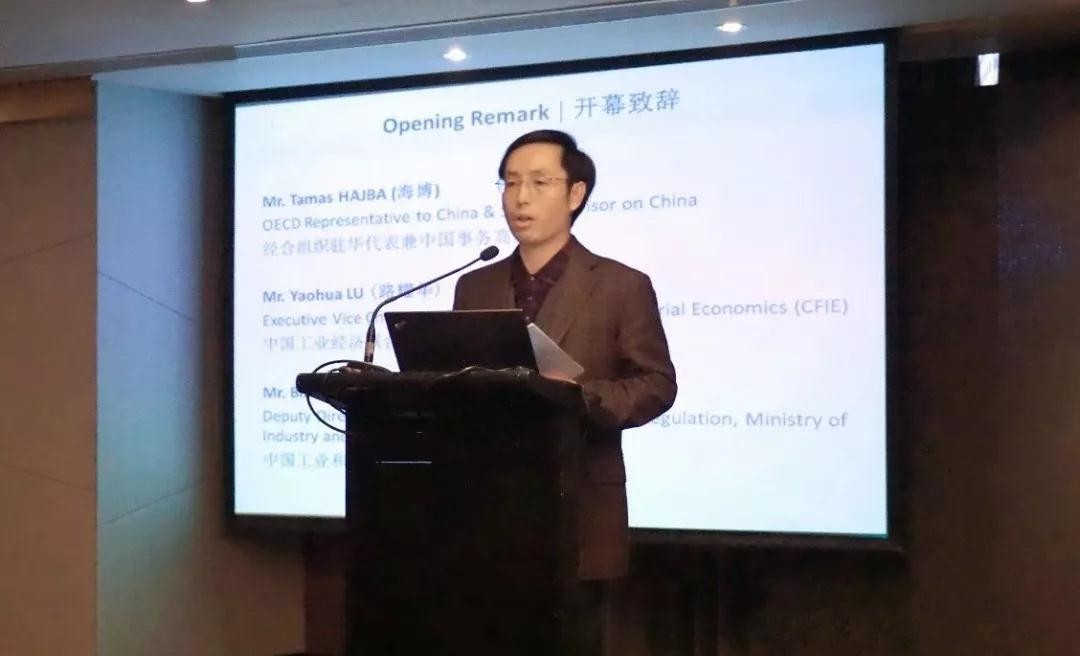
Mr. Bin FAN introduced that during recent years, MIIT has taken the line of thinking characterised by “government-driven, industry-guided, enterprises-led, public-engaged” model to build the social responsibility policy system for industrial enterprises, enhance their CSR awareness and management, and promote responsible procurement, investment, manufacturing and consumption, jointly creating a responsible industry chain.
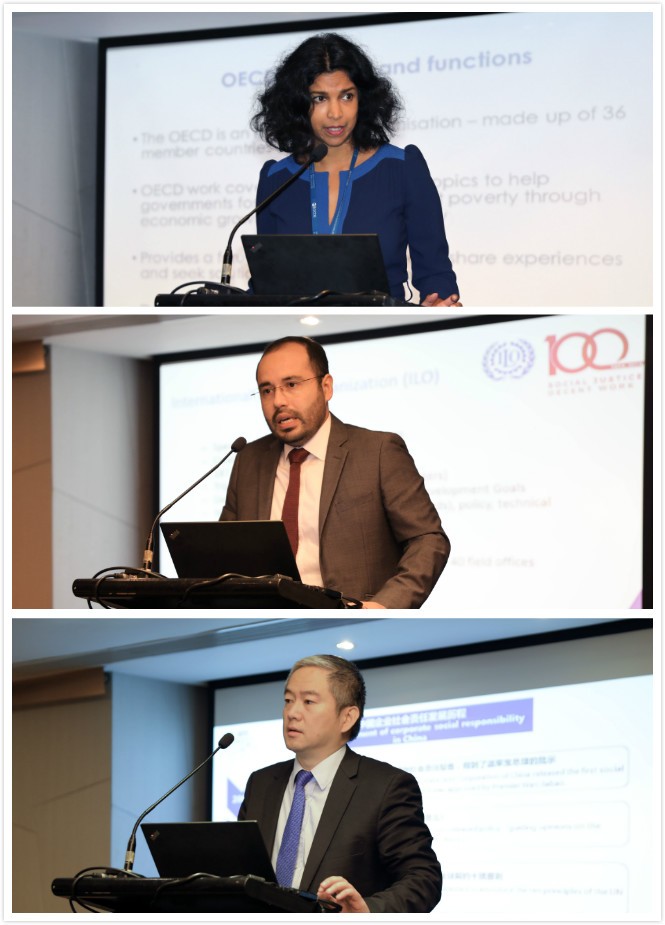
In the session of “International RBC standards and relevance to China”, Ms. Shivani KANNABHIRAN, Policy Analyst of Responsible Business Conduct, OECD, elucidated the principles and guidelines of OECD in responsible business conduct, as well as OECD-China partnership. Mr. Fredy GUAYACAN BENITEZ, Programme Manager, Responsible Supply Chains in Asia, International Labour Organisation (ILO), shared the way ILO promotes decent work and its efforts in building responsible supply chain. Dr. Xiaoguang WANG, Director for the Corporate Social Responsibility Promotion Centre, CFIE, reflected on the CSR development of Chinese enterprises and analysed challenges that enterprises face and the future trends.
In panel discussion, regarding “Responsible Business Conduct - why it matters and how to integrate standards into operations”, five panellists shared the experience of the enterprise or institution they work for. Mr. Xiaobing WANG, Executive Secretary of the Corporate Social Responsibility Committee, China Electronics Standards Association (CESA), explained the opportunities and challenges that the electronics industry faces in terms of corporate social responsibility. Ms. Meihua LIU, CSR Manager, Fuji Xerox, shared the experience of Fuji Xerox in building a sustainable business ecosystem. Ms. Xinying MA, Director of the Office of Sustainable Development and Total Risk Management in China COSCO Shipping Corporation Limited, elaborated on the measures of COSCO in risk management and compliance. Ms. Sudan WANG, Economist, China Machinery Engineering Corporation, illustrated the sustainable governance system established during the whole life cycle of projects. Mr. Rob LEDERER, Executive Director, Responsible Business Alliance (RBA), explained how RBA helps enterprises with responsible business conduct.
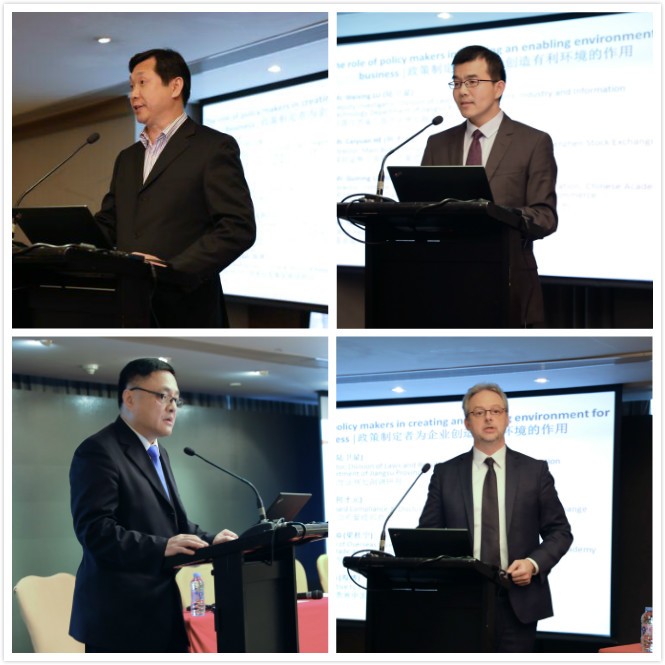
Regarding “the role of policy makers in creating an enabling environment for business”, a profound discussion was held on measures adopted by China and OECD members and experience and practices that are worth learning from each other.
Mr. Weixing LU, Deputy Investigator, Division of Laws and Regulations, Industry and Information Technology Department of Jiangsu Province, introduced the work progress and future plans of Jiangsu Province in promoting corporate social responsibility. Mr. Caiyuan HE, Main Board Compliance & Disclosure Department, Shenzhen Stock Exchange, shared systems and regulatory measures taken in recent years by Shenzhen Stock Exchange to create a healthy business environment. Mr. Guining LIANG, Director, Institute of Overseas Investment, Chinese Academy of International Trade and Economic Cooperation, Ministry of Commerce, explained the current situation of the construction of the Belt and Road initiative and sustainable development of Chinese enterprises overseas. Mr. Tamas HAJBA pointed that given that laws and regulations vary across the nations, enterprises should make full use of the existing universal business principles.
Later, focusing on “OECD due diligence framework: What does a risk-based approach entail”, Ms. Shivani KANNABHIRAN introduced the OECD Due Diligence Guidance for Responsible Business Conduct and the guidelines developed for a few industries. Mr. Rob LEDERER provided participants with information about RBA’s code of conduct and how to improve enterprises’ responsible conduct under guidance. Ms. Jing SUN, CSR Senior Manager, Huawei Consumer Business Group, shared the sustainable development and CSR management of the supply chain of Huawei.
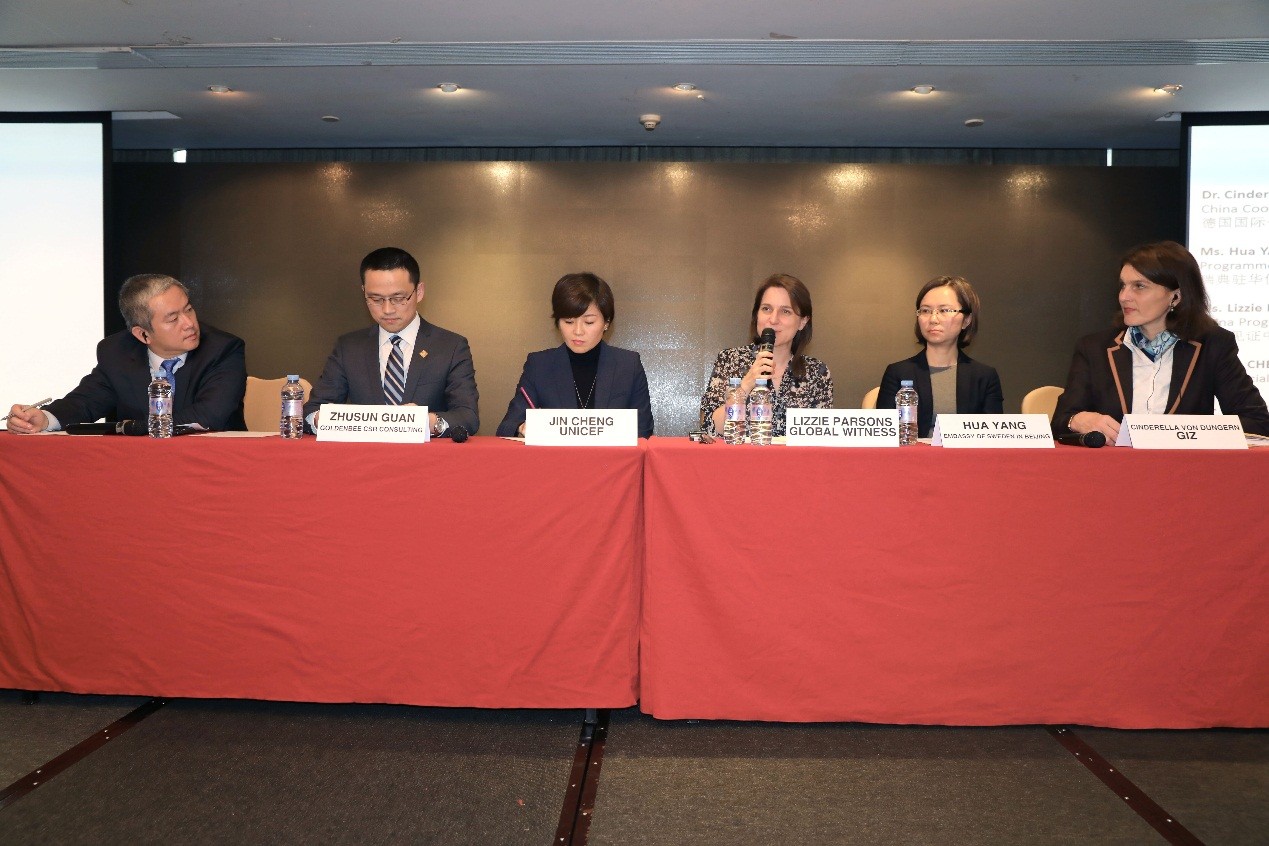
Collaboration with stakeholders can help businesses develop effective due diligence systems. In this session of “Working with international stakeholders”, representatives from international stakeholder groups shared their experience of working with companies in China and abroad to promote responsible business conduct, as well as the challenges that they have confronted with.
Ms. Jin CHENG, CSR Specialist, UNICEF, called on enterprises to pay attention to the impact of business conduct on children’s rights. Dr. Cinderella VON DUNGERN, China Coordinator, Emerging Market Sustainability Dialogues, GIZ, introduced that GIZ has actively promoted dialogues, communication and experience sharing between all stakeholders, and facilitated enterprises to do right things and make right decisions. Ms. Hua YANG, Programme Officer, CSR Centre, Embassy of Sweden in Beijing, explained how the embassy helps Swedish enterprises and their Chinese suppliers benefit from cooperation on sustainable development. Ms. Lizzie PARSONS, China Programme Leader, Global Witness, shared the three roles that institutions play in promoting enterprises’ fulfillment of social responsibilities, i.e., providing valuable information to enterprises, proving suggestions for policy makers, and implementing long-term supervision over CSR work progress and quality. Mr. Zhusun GUAN, Executive Deputy General Manager, GoldenBee CSR Consulting, shared the experience of GoldenBee in the cooperation with governmental institutions or nongovernmental international institutions. He also put forward with valuable suggestions on international organizations facilitating Chinese enterprises to better implement responsible business conduct.
In the end, Ms. Shivani KANNABHIRAN made a summary of the seminar. The seminar created a favorable platform for promotion and exchange of responsible business conduct, providing extensive and profound references for us to think about how enterprises can play an active role in economic, environmental and social development.
China is a key partner country of the OECD. Collaboration on RBC focuses on supporting the alignment of Chinese RBC sector standards with international standards. Building on the constructive outcome of the OECD-China Joint Programme of Work for 2015-16, the OECD and China are in discussion for a new joint work programme, which includes strengthening cooperation on RBC. This co-operation will build on the continuous partnership between the OECD and China and will be supported by a joint EU-ILO-OECD programme of Promoting Responsible Supply Chains in Asia, including in China over the period of 2018-2020.